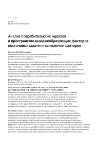Analysis of consumer ideals in the space of image-forming factors: setting the problem and identifying factors
DOI: 10.33917/mic-2.97.2021.19-31
The problem of analyzing consumer ideals in the image-forming space with an emphasis on the correctness of the application of methods and the interpretation of the results is considered. The problem definition and the features of using the methods of its solution are discussed. The approaches and methods of identifying image-forming factors that determine market processes and constructing a market structure in which market objects are displayed in the optimal form for solving the task are analyzed. The concept of product/ brand/ company promotion based on the analysis of consumer ideals is presented.





